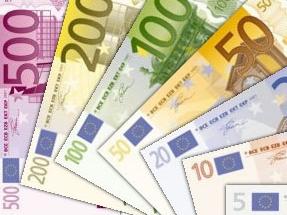Europe gets behind unified plan to try to solve Euro crisis
Euro banknotes (Illustration by Andrew Netzler.)
Story from PRI’s The World. Listen to the above audio for a complete report.
Investors on Wall Street were in a good mood Thursday, due in part to the good news from Europe.
Leaders there say they’ve taken a major step toward solving their ongoing debt crisis.
After a marathon negotiation session in Brussels, they announced a three-point plan to help Greece and keep the problems there from spreading through the Eurozone.
In recent days, there ‘s been a lot of skepticism about Europe’s ability to deal with its economic crisis. Officials in the United States and China — two economies with strong ties to the European Union — were paying particular attention.
But European Commission President Jose Manuel Barroso claimed success.
“I made it very clear that Europe needed to deliver a comprehensive response to the sovereign debt crisis and I believe that now we have a very solid way forward,” Barroso said.
So, what exactly is the plan?
First, private European banks that hold Greek debt would agree to slash it by 50 percent. Second, those banks would also raise more money, to further protect themselves against exposure to Greek debt. And third, a European bailout fund for economies on the brink would expand to $1.4 trillion.
A few days ago, a European official promised that the EU would come up with a “bazooka” to tackle the economic problems. So is this EU agreement that “bazooka?”
Maybe not.
“I think what they put on the table is at best a rather old-fashioned bow and arrow. It’s a water pistol,” said Johan Van Overveldt, author of The End of the Euro.
He said that slashing privately held debt will help Greece, but not as much as people think.
“Greece will still be left with a deficit for this year and next year of at least eight percent of GDP, which is huge, and which will oblige the Greek government to keep doing cuts in expenditures and more taxes,” Van Overveldt said. “That means the Greek government will remain in recession, and the situation will remain more or less the same.”
It’s also not clear from the EU announcements where banks will get the money to shore themselves up.
Will it come from EU governments? Will it come from the bailout fund? To be determined.
And speaking of that bailout fund, EU leaders say they want to more than double it. But James Meadway of the London-based New Economics Foundation asks: double what exactly?
“It has really quite limited reserves of its own, but it has a lot of promises to pay from the various European powers behind it. And of course promises can evaporate very, very rapidly.”
People warned about the eurozone’s current woes when the euro was first introduced, said Lutz Ebring of the Free University in Berlin.
“This is simply the result of having a common currency, without a common fiscal or economic policy, without a common centralized mechanism that controls how the money is spent. So every country goes out and overspends,” he said. “The Italians overspend and say the Germans will bail us out, because they obviously can’t allow the system to collapse.”
Ebring said that one good thing about the current crisis is that it’s forcing countries to come to terms with this. It might, he said, mean that more economic policy integration, not less, is on the horizon in Europe.
But then again, none of it might happen without a country like China stepping in.
On Thursday a spokeswoman for the Chinese Foreign Ministery said China supports the “serious methods taken by the EU in tackling the current challenges,” and she added that China would like to deepen our cooperation with the EU.
Some say China might agree to use some of its significant cash reserves to help boost Europe’s banks or the IMF. It could also use some of that to buy up, say, Greek state-owned businesses slated for privatization.
But for Johan van Overveldt, the notion that Europe can’t get itself out of its own mess is what he calls the end of the dream.
“We’ve come to a point where this whole European construction that was built on so many promises that were half empty, or only half full depending on how you look at it. The day of reckoning has arrived. It’s no longer accepted by the markets, or by the rest of the world, that we go about our affairs in that way.”
EU officials caution it will take time to finalize and implement Thursday’s agreement. The last increase in the Eurozone bailout fund took months for all the national parliaments to approve.
As one EU official tried to remind everyone — “This is a marathon, not a sprint.”
———————————————————-
PRI’s “The World” is a one-hour, weekday radio news magazine offering a mix of news, features, interviews, and music from around the globe. “The World” is a co-production of the BBC World Service, PRI and WGBH Boston. More about The World.
